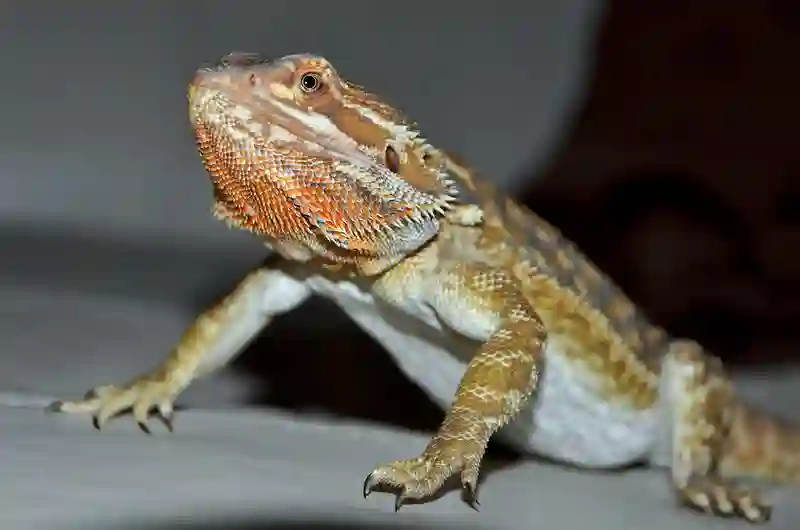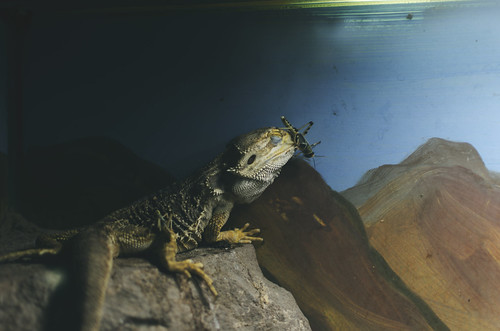In addition to crickets, baby bearded dragons or hatchlings can also eat vegetables and leafy greens, fruit, locusts, super worms, and dubia roaches.
For baby bearded dragons, it is important to provide a balanced diet that includes both protein and vegetables.
Why Variety Matters in Your Baby Bearded Dragon’s Diet
Feeding your baby bearded dragon a diverse diet is crucial for several reasons:
- Nutritional balance: Different feeder insects and vegetables provide unique nutrients that contribute to the overall health of your baby bearded dragon.
- Appetite stimulation: Offering a variety of foods can help encourage your pet to eat more and maintain a healthy weight.
- Preventing food boredom: Rotating food options keeps mealtimes exciting for your bearded dragon and helps prevent picky eating habits.
Insect Alternatives to Crickets
While crickets are a popular staple in the bearded dragon diet, there are numerous other insects you can offer to your baby bearded dragon:
- Dubia roaches: Rich in protein and relatively low in fat, these insects are a nutritious option for your baby bearded dragon. They are also easy to digest and less likely to carry parasites.
- Black soldier fly larvae (Phoenix worms): These calcium-rich larvae are an excellent choice for promoting healthy bone development in your growing pet.
- Waxworms: Although high in fat, waxworms can be offered occasionally as a treat to add variety to your bearded dragon’s diet.
- Mealworms: Rich in protein, mealworms should be fed sparingly due to their high chitin content, which can be difficult for baby bearded dragons to digest.
- Butterworms: Another high-fat treat option, butterworms can be provided occasionally for added diversity in your pet’s diet.
Vegetables and Greens for a Balanced Diet
In addition to insects, it’s important to incorporate vegetables and leafy greens into your baby bearded dragon’s diet. Here are some excellent options to consider:
- Collard greens: High in calcium and vitamins, collard greens should be a staple in your bearded dragon’s diet.
- Turnip greens: Another excellent calcium-rich choice, turnip greens also provide essential vitamins for your pet.
- Mustard greens: Packed with vitamins and minerals, mustard greens are a nutritious addition to your bearded dragon’s diet.
- Dandelion greens: These calcium and vitamin-rich greens can be found in your backyard or purchased from a grocery store.
- Butternut squash: This low-oxalate vegetable provides essential nutrients and is a favorite among bearded dragons.
Tips for Feeding Your Baby Bearded Dragon
To help your baby bearded dragon thrive, keep these feeding tips in mind:
- Chop vegetables finely: Ensure all vegetables are cut into small, manageable pieces for your baby bearded dragon to avoid choking hazards.
- Monitor calcium intake: Supplement your bearded dragon’s diet with calcium powder to support healthy bone development.
- Establish a feeding schedule: Offer food to your baby bearded dragon multiple times a day, gradually decreasing the frequency as they grow older.
Conclusion
Remember to consistently offer a mix of nutritious insects and vegetables, supplement their diet with calcium, and establish a suitable feeding schedule. As your bearded dragon grows, continue to adjust their diet to meet their changing nutritional needs.
Frequently Asked Questions about Baby Bearded Dragon Diets
In this section, we’ll address some common questions and concerns related to baby bearded dragon diets:
How often should I feed my baby bearded dragon?
During the first few months, feed your baby bearded dragon three times a day. Gradually reduce the frequency to twice a day as they grow older and eventually to once a day for adult bearded dragons.
How much should I feed my baby bearded dragon?
Allow your bearded dragon to eat as much as they want within a 10-15 minute period during each feeding session. Remove any uneaten food to prevent spoilage.
When should I introduce vegetables to my baby bearded dragon’s diet?
Start introducing finely chopped vegetables and greens to your baby bearded dragon’s diet around the age of 4-6 weeks. Gradually increase the number of vegetables as they grow older.
Do baby bearded dragons require vitamin supplements?
Yes, in addition to calcium supplements, it’s essential to provide a multivitamin supplement for your baby bearded dragon. Follow the manufacturer’s recommendations for appropriate dosing.
How can I ensure my baby bearded dragon stays hydrated?
Provide a shallow water dish in their enclosure and mist their vegetables with water to promote hydration. You can also offer occasional baths for additional hydration.


